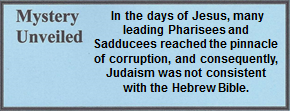08.01.02 Lk. 6:24-26
WOES PRONOUNCED
24 But woe to you who are rich,
for you have received your comfort.
25 Woe to you who are now full,
for you will be hungry.
Woe to you who are now laughing,
for you will mourn and weep.
26 Woe to you when all people speak well of you,
for this is the way their ancestors used to treat the false prophets
Luke and Matthew both gave dire warnings to those who failed to repent from their wicked lifestyle and corrupt religious service in the name of God. They placed their message in a slightly different order, but the styles are amazingly similar. It is important to notice that all too often these woe passages have been directed only towards the Pharisees (Mt. 23:1-12), when in reality, these were applied to most of the aristocratic leaders who served in the temples. That entire group – the leading Pharisees, Sadducees, scribes, and elders – claimed to be the light of God’s holy law but failed to recognize their own short-comings; their shallowness and hypocrisy; their utter darkness. Since Jesus gave these warnings to the leaders of His day, the church leaders of today need to examine themselves to see if the same message might apply.
The woe statements are profoundly sobering. The Jewish leaders were entrusted with the souls of men and failed to perform their duties as required. Since Jesus was so powerfully direct with them, it is obvious that His message and expectations remain unchanged concerning church leaders today.[1] Likewise, in later years, the rabbis wrote of these same religious leaders whom Jesus condemned, and those rabbis referred to the seven plagues of the Pharisees.[2]

“Woe to you who are now laughing.” The term woe is both an announcement of guilt and the pending judgment that is about to follow.[3] It is a dirge, a lament for the dead.[4] The term laughter is seldom descriptive of humor or festive events, but rather, it is descriptive of scorn and mockery as in this passage, or as a pun or play on words.[5] This adds insight to the phrase woe which in Greek is ouai, and also refers to both anger and sorrow.[6]
[1]. See also 09.02.02. 11.02.05, and 13.05.02-05.
[2]. Jerusalem Talmud, Berakhot 9, 14b.
[3]. Levy, The Ruin and Restoration of Israel. 182.
[4]. Smith, Augsburg Commentary on the New Testament: Matthew. 157, 274.
[5]. Pilch, The Cultural Dictionary of the Bible. 92-93.
[6]. Lang, Know the Words of Jesus. 182.